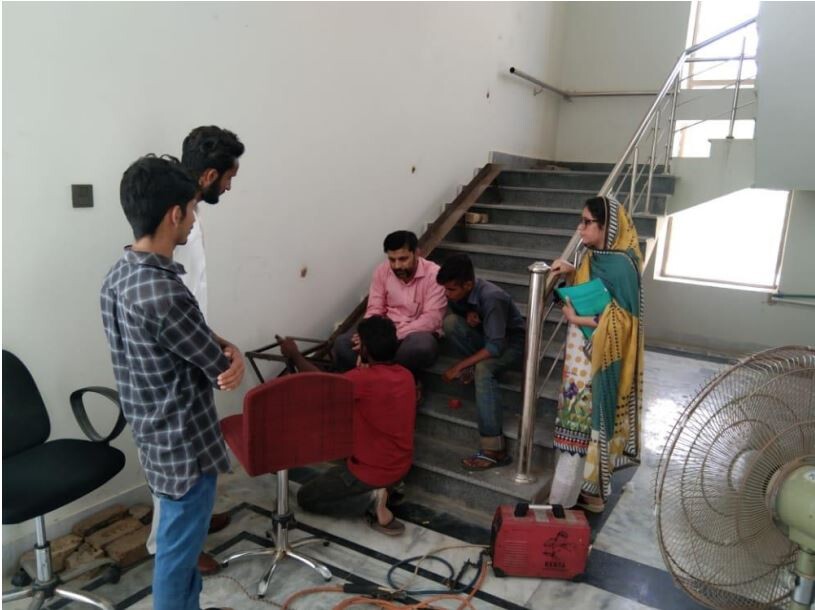With their development of a “Low-Cost Stairlift” through IEEE’s “Access and Abilities Competition,” a student team from Pakistan aims to offer new hope for those with mobility impairments
According to recent estimates from the World Health Organization (WHO), some 1.3 billion people – roughly 16% of the world’s population – suffer from significant disabilities that impair their mobility, including 75 million who are wheelchair-bound. This reality, combined with a global increase in the population of individuals 65 and older (a segment which is particularly susceptible to mobility issues), supports the growing need for devices that expand access to public and private institutions and enhance quality of life.
It’s a challenge that a student team in Pakistan is rising to meet with their “Low-Cost Stairlift.” Through this unique project – a finalist in EPICS in IEEE’s “Access and Abilities Competition” – they’re hoping to introduce an affordable device that will usher in a new degree of hope, independence, and inclusivity for differently abled users in their region.
In the following interview, Muhammad Saleem Umrani – a 2022 Electronics Engineering graduate of Mehran University of Electronics and Technology in Jamshoro, Sindh, Pakistan and Team Lead for the “Low-Cost Stairlift — Pakistan” project – discusses his motivations behind the stairlift, the status of this innovation, and the team’s goals for this transformative device.
Please discuss the need for your low-cost stairlift in Pakistan.
Umrani: An estimated 20 million people in Pakistan require facilities to access multi-story buildings, so the pressing need for affordable and locally available solutions has become evident. Existing stairlifts aren’t easily accessible or manufactured within the country, which poses a significant challenge for those with mobility impairments. To address this issue, our proposed low-cost stairlift aims to provide a practical solution for individuals with impaired mobility and ensure that accessibility isn’t hindered by financial constraints or stairlift availability; this initiative also aligns with the provisions of “The Accessibility Code of Pakistan 2006.” On a personal note, we’ve observed some university instructors experiencing difficulties accessing upper-story buildings and my mentor’s own family includes a member with health challenges – all of this inspired us to create a system that could address such needs. Ultimately, we hope to offer facilities to differently abled individuals at affordable prices.
When did your project start and when will it conclude?
Umrani: We initiated this effort as our final-year project in November 2021 and successfully achieved the Minimum Viable Product (MVP) milestone in October 2022. We then applied to EPICS in IEEE to expand our project’s scope to cater to curved stairs and we anticipate completing this extended phase by mid-2024. Our team is composed of approximately 20 individuals, including graduates and final-year students hailing from such diverse departments as Mechatronics, Mechanical, Software, Electronics, and Telecommunication Engineering as well as university professors and volunteers. Notable contributors to the team include CAD designers Ghulam Fareed, Fida Hussain, Abdul Wasiu, Mehdi Roohullah, and Faraz Mustafa, microcontroller programmers Hamza, Tayaba, Bisma, Farwa, Shigraf, Mustafa, and Muhammad Ali Soomro, and dedicated volunteers Asia, Maryam, Pardeep, and Rashid Wassan. Our mentors include Professor/Dr. Attiya Baqai, Professor/Dr. Tanweer Hussain, and Engineer Burhan Aslam.
Please share some of the key milestones you’ve achieved and your upcoming goals.
Umrani: We’ve successfully finished the Minimum Viable Product (MVP) for the project, which is specifically designed for straight stairs. We made a prototype mobile app, introduced a finger recognition module for authentication, and developed a voice/keyword spotting module to activate the stairlift through voice on request from our community partner. We also conducted a visit to Hands Independent Living Center (ILC) Hyderabad (a support center for people with disabilities in the Hyderabad region in the Sindh province of Pakistan), where we took measurements, finalized our design using 3D software, and procured the necessary components. Our next major milestone is to finalize this project, install a curved stairlift that will bring our CAD model into real life, and proceed to the next site.
What is your hope for this project and the impact you wish to have on your target audience?

“Members of the “Low-Cost Stairlift – Pakistan” team — discuss and adapt their design in a stairwell setting”*
Umrani: Through the implementation of this initiative, we hope to have a positive impact on the lives of approximately 500 individuals at Hands ILC Hyderabad by enabling them to independently navigate low-rise buildings.
Finally, what would you like to share about the EPICS in IEEE program and the financial and technical support they’ve provided to help you achieve your project objectives?
Umrani: The EPICS in IEEE program has afforded us essential resources and financial support which has enabled us to conduct thorough research and successfully realize our project ambitions without encountering any obstacles. We wholeheartedly encourage fellow students and young innovators to bring forth their groundbreaking ideas, seek assistance from IEEE’s “Access and Abilities Competition,” and shine brightly, like the sun. We recognize that many young innovators possess excellent ideas but often lack the necessary funds and resources to activate them; the IEEE program serves as a valuable avenue for them to secure the support and facilities they need. Additionally, IEEE allows awardees to collaborate with any NGO/NPO for further assistance – this was a turning point for us in that it transformed our project from considering design only to also helping us focus on the actual and diverse needs of users.
This project is part of the EPICS in IEEE Access and Abilities Competition and the funding for this project was made possible by the Jon C. Taenzer Memorial Fund established by the IEEE Foundation in 2019 with a generous bequest from the Estate of Mr. Taenzer, an IEEE Life Senior Member. For more information on EPICS in IEEE’s “Access and Abilities Competition”, visit https://epics.ieee.org/get-involved/access-and-abilities-competition/.
*image courtesy of the “Low-Cost Stairlift – Pakistan” team/Mehran University of Electronics and Technology

Recent Comments